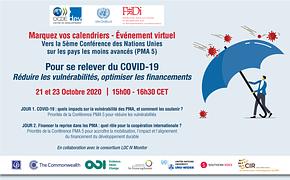
The COVID-19 crisis is wreaking havoc development progress. It also presents an opportunity for rethinking economic vulnerability of the Least Developed Countries (LDCs), and developing countries more generally. Vulnerability, which is captured as one of the main criteria for the inclusion of countries into the LDC list, is of growing importance. It is measured by the economic and environmental vulnerability index (EVI) an index that captures the country’ structural vulnerability to economic and environmental shocks. However, in light of growing concerns on the exposure to international shocks and the compounding of several risks, it is necessary to rethink how to properly assess countries’ vulnerabilities and how to ensure that the international support system helps the LDC address them.
The first panel aimed to highlight emerging risks and discuss how to address the vulnerabilities and build resilience of LDCs to inform the process leading to the Fifth UN Conference on the LDCs (LDC5), to be held in Doha, Qatar in January 2022.
Welcome and expected outcomes
Keynote remarks
Setting the scene: Measuring and addressing vulnerabilities
Panel discussion: What priorities for the LDC5 to tackle vulnerabilities?
Ali SABUNCU, Head of Economic and Social Development Research, Presidency of Strategy and Budget, Presidency of The Republic of Turkey
Q&A - Possible interventions from other partners
Closing remarks
The latest report of the UN Secretary-General on the implementation of the Istanbul Programme of Action (IPoA) presented growing concerns on LDCs development progress and support measure beyond graduation already before the COVID-19 pandemic reached them. It stated that foreign direct investment had declined further, the share of exports from the LDCs in world trade remained low, structural transformation and productive capacity gains had been slow, economies were still largely commodity-based and the growth in the rate of undernourishment in the LDCs remained a concern. Financing the recovery poses additional challenges to already existing ones in order to allow LDCs to overcome the vulnerabilities discussed in the first panel, and embark and remain on a strong and sustainable development path, including after their graduation.
The second panel discussed what new approaches and tools could increase the mobilisation, impact and alignment of Financing for Sustainable Development in the LDCs.
Opening remarks by partner institutions
Presentation
Panel discussion: What priorities for the LDC5 to increase mobilisation, impact and alignment of Financing for Sustainable Development?
Q&A
Possible interventions from other partners
OECD Development Centre / UN OHRLLS / FERDI
